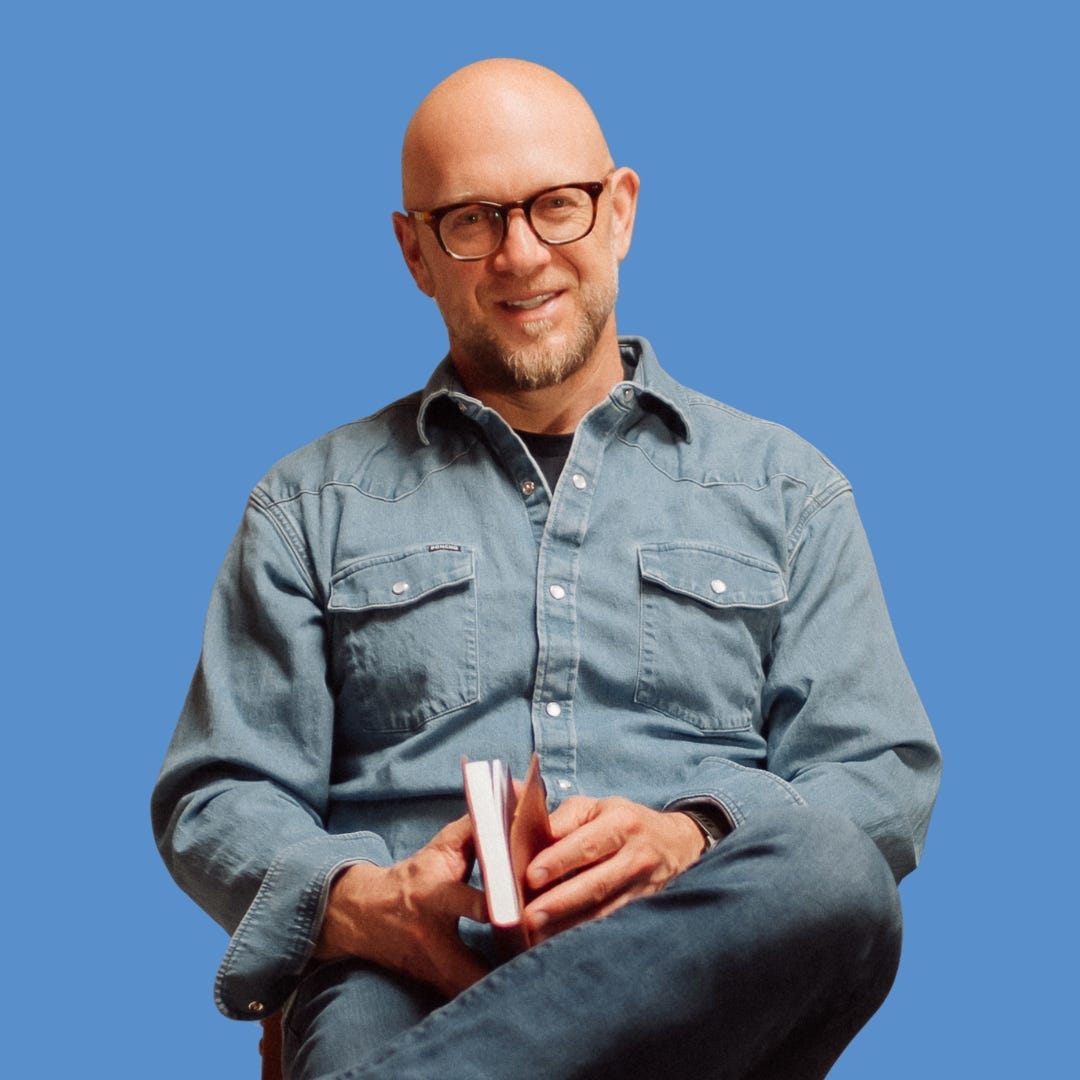The Recovering Academic - An Interview with Joshua Doležal
A Beyond the Bookshelf Profile
Exploring Life and Literature
Dear friends,
April is National Poetry Appreciation Month in the U.S.. Last year, I wrote about how poetry terrified me at times. You can find a link to that article at the end of this one if you are interested. This year, I focus on a poetry collection that impacted me, Someday Johnson Creek, by my friend
. I first encountered Joshua through his publication, The Recovering Academic, where he discusses leaving the world of academia and charting a new path for himself. Over the past couple of years, I have grown to respect Joshua’s opinion and value his writing. In today’s interview, we hear about his life as a reader and writer, his inspirations, and his thoughts on the role of poetry in understanding and appreciating nature. I hope you enjoy this exploration beyond the bookshelf as we continue our exploration of poetry.**This interview may be too long to read completely in your email and may need to be opened in your internet browser.**
You can purchase a copy of Joshua’s poetry collection using the button below.
Someday Johnson Creek is a masterful tribute to the natural world—its breathtaking beauty, quiet moments of reflection, and undeniable brutality. The collection is structured so that the poems flow seamlessly from one to the next, creating a narrative that feels organic rather than rigidly constructed. With an accessible style, Doležal invites readers to step into the landscapes he so vividly paints, making them feel as though they, too, are standing amid towering pines, watching the dance of sunlight on rippling waters, or bearing witness to the inevitable cycle of life and death in the wilderness. This collection is a must-read for anyone who has ever felt a deep connection to nature, as it resonates with the tranquility and the raw power of the outdoors.
Doležal’s poetry has a rare immediacy—his language is neither overly ornate nor overly simplistic, striking a balance that makes his work both accessible and deeply moving. He is a poet who understands that nature does not need embellishment; instead, he allows the inherent wonder of the world to shine through with carefully chosen words and evocative imagery. Whether describing the hush of snowfall, the resilience of an ancient tree, or the fleeting presence of a wild creature, his work immerses readers in a sensory experience that is at once intimate and universal.
One of the most striking aspects of Someday Johnson Creek is its ability to capture the paradoxes of the natural world. While Doležal celebrates the grandeur and serenity of the outdoors, he does not shy away from its harsh realities. Nature is not merely a place of refuge but also one of struggle and survival. In one poem, a fawn takes its first trembling steps, embodying innocence and wonder, while in another, the swift and merciless hunt reminds us of nature’s brutal laws. This duality—the coexistence of beauty and brutality—is woven throughout the collection, lending it depth and authenticity.
For those who have spent time in the wild, Doležal’s poems will evoke memories of their encounters with nature. Reading Someday Johnson Creek was like stepping back into the misty forests of the Pacific Northwest, where I once wandered among ancient cedars and watched the sun break through storm-heavy clouds. Doležal’s words transported me, reminding me of the solace and exhilaration in wild places. His poems capture the sights and sounds of nature and the emotions it stirs within us—the awe, the reverence, the bittersweet recognition of our fleeting place in the grand scheme of things.
Doležal’s poetic voice is reminiscent of some great nature poets—Mary Oliver, Wendell Berry, and Robert Frost come to mind—but his perspective is uniquely his own. His work has a quiet humility and a deep respect for the land that never feels forced or performative. His poems do not impose meaning on nature; instead, they observe and reflect, allowing readers to draw their connections and insights. This is one of the collection’s greatest strengths: it does not dictate how we should feel about the natural world but invites us to experience it alongside the poet.
The structure of Someday Johnson Creek also deserves praise. The poems flow seamlessly from one to the next, creating a narrative that feels organic rather than rigidly constructed. Themes of time, memory, and transformation thread through the collection, giving it a sense of cohesion while allowing each poem to stand on its own. The pacing is deliberate, alternating between moments of quiet introspection and bursts of vivid, almost cinematic imagery. This careful arrangement enhances the collection’s emotional impact, making it a book that rewards multiple readings.
Another notable aspect of Doležal’s work is his attention to small details. He does not merely describe a tree; he captures how its bark feels beneath the fingertips, the scent of pine carried on the wind, and the play of shadow and light across its branches. He does not simply mention a river; he conveys its movement, its sound, and its relentless carving of the landscape. These details create a sense of immediacy that draws the reader in, making them feel as though they are not just reading about nature but experiencing it firsthand.
In addition to its natural imagery, Someday Johnson Creek explores deeply personal themes of memory, loss, and belonging. Many poems carry a sense of nostalgia, reflecting on places and moments that have shaped the poet’s life. This adds an emotional layer to the collection, making it an ode to nature and a meditation on what it means to be human. Doležal recognizes that our lives are intertwined with the landscapes we inhabit, and his poetry reflects this interconnectedness in a poignant and heartfelt way.
Someday Johnson Creek is a gift for poetry lovers and nature enthusiasts alike. It reminds us to slow down, observe, and appreciate the grandeur and minutiae of the world around us. This collection acknowledges the fragility of life even as it celebrates its resilience. Above all, it is a testament to the enduring power of poetry to connect us—to each other, to our memories, and to the natural world that sustains us.
In a time when many of us are increasingly disconnected from nature, Doležal’s poetry serves as both a reminder and an invitation to step outside, listen, and bear witness to the beauty and complexity of the world around us. Whether you regularly find solace in the outdoors or long to reconnect with it, Someday Johnson Creek will resonate deeply. It is a collection that lingers long after the final poem is read, much like the echo of birdsong in a quiet forest or the ripple of a stream winding through the hills.
With Someday Johnson Creek, Joshua Doležal has given us something truly special—a book that is not only beautifully written but also profoundly moving. It is a collection that speaks to the heart, reminding us of the wonder in the everyday world and the stories etched into the landscapes we cherish. This is poetry at its finest: immersive, evocative, and deeply, beautifully human.
Joshua, where are you from originally, and where do you live now?
I was born and raised in northwestern Montana, near Glacier Park. I now live in central Pennsylvania.
Can you tell us a little about yourself—family, hobbies, how you like to spend your time, or anything else you might want to include?
I was an English professor in Iowa for 16 years and am presently a professor emeritus at my former employer. After leaving higher ed in 2021, I moved with my family to Pennsylvania; two years later, my ex and I divorced. I’m now a single father to three children, ages 12, 8, and 6. In addition to my Substack writing, I work as a book coach and developmental editor. Fitness is an important part of my life: weightlifting, running, and cycling during the warmer months. I’m also a devoted gardener. In a former life I styled myself a singer-songwriter and performed at local coffee shops and pubs; now I’m content to be a campfire guitarist. The handful of tunes I’ve written over the past ten years are mostly ditties for my kids.
Your poetry collection, Someday Johnson Creek is deeply rooted in place and memory. How do landscape and environment shape your poetry?
I worked as a wilderness ranger for three summers in the Selway-Bitterroot Wilderness in northern Idaho. During my final season at the Moose Creek District I resolved to write a hundred poems and turn them into a book. For the full story, please see “Why It Took 20 Years to Publish This Book.”
The Mountain West shaped my childhood and remains the dominant influence on my imagination. I reflect on this in my memoir, Down from the Mountaintop, which includes my struggle to adapt to a prairie landscape. Mountains feel like they have come whole from heaven. There is nothing more to create; the writer must simply listen, watch, and absorb those surroundings. The prairie, by contrast, is more elusive. There is a lot of what looks like emptiness, but isn’t. Understanding it requires a more close-up view of the ground at your feet, the composition of the soil, the natural history of the place and how agriculture has transformed it.
The Idaho wilderness has seen changes, too, but it feels more primeval. That was the original idea behind the Wilderness Act, to set aside sanctuaries for wildness and to require everyone visiting them to use only pre-industrial tools. While I was writing the poems in this collection, I was carrying my food, tools, and shelter on my back, clearing trees from the trail with a crosscut saw and axe, repairing damaged tread with a shovel and pick mattock. That feeling of being connected to the place through work, not recreation, is fundamental to the book.
Your poetry often explores themes of family, loss, and nostalgia. How do you approach writing about personal history while maintaining a sense of universality?
It’s often said of memoir that it ought to teach the reader as much about their own life as it does about the author’s life. That is also my goal with poetry. It requires being selective about personal material, but by being faithful to those memories that I think resonate more broadly, I believe I can build a bridge with readers who might otherwise have little in common with me.
Do you see poetry as a way to bridge past and present, or is it more of a process of preservation?
Both. Some poems fuse memories with present observations. Some poems are more grounded in the present. I’m not sure I have many poems that are solely backward-looking, but I do have some that come from intense focus in the moment. For instance, “Geometric,” one of the poems in my book, came from an epiphany while walking in the high country, above the treeline. I thought of the Pythagorean theorem, how it explains the relationship between all sides of a triangle, and I thought of my body and the earth as two of those sides, and of my vision as the hypotenuse that connected my body to the ground beneath my feet. There is no past in that poem, just an attempt to render the essentials of that epiphany in such a way that a reader could experience it afresh.
Were there any particular poets or works that influenced Someday Johnson Creek?
So many. I carried a huge stack of books with me into the wilderness that summer. Gary Snyder, Rita Dove, Charles Simic, Ted Kooser, Sharon Olds, Audre Lorde, Joy Harjo, Sherman Alexie, Philip Levine, Mary Oliver – so many others. Oliver’s American Primitive is one of my major influences.
You have previously written and published a memoir. How does your writing process differ between poetry and memoir?
I cannot write poetry on a computer. It must begin longhand in a notebook, typically in a sheltered place with few distractions. Most of the poems in this volume were written in a log cabin 30 miles from the nearest road. Prose is different – I need 3-4 hours of linear time, typically at a computer. It helps if I write at a regular time and place. I inherited my grandmother’s roll-top desk a few years ago, and that has become an important physical touchstone for my writing practice.
If you are asking about the differences in how I approach each genre, I can only say that poetry is a distillation of meaning, a compressed rendering, and that I often strive toward something like epiphany. As a friend once said, a good poem “detonates” at some point near the end. Memoir offers more room for scene setting and reflection, for moving between the voice of innocence immersed in particular situations and the voice of experience looking back on those events and making meaning of them. Poems often center on particular images. Memoir begins with questions or something unsettling that I must write toward clarity about.
Do you find poetry a more intuitive form of storytelling?
I’m not sure my poems tell stories. Maybe a few of them do. Certainly the rhythm and lyricism of poetry is intuitive. And there is no forcing epiphany. It comes or it does not. When it comes, I do my best to gratefully receive it and then render it in ways that allow the reader to share that discovery by drawing their own associations.
What role does revision play in your poetry? Do you write in longhand first, or do you compose digitally?
Always longhand. Revision takes place at the computer. Every word counts in a poem. I’m not afraid of cutting. As another friend writes, when I’m revising, “bullets fly from my fingers.” But there is also a softer side of revision, which is allowing a piece to reach its full potential. I speak about this in “June Huckleberry” (a poem about a ripe berry that was almost a full month out of season) and in a poem simply titled “Revision” (which compares trail work to perfecting a poem). Sometimes revision is just labor, but other times it is very experimental, like that odd huckleberry, which I saw as the land trying something new. Sometimes revision means writing and rewriting, riffing as many times as it takes to feel sure.
Do you have any writing rituals or habits that help you enter the creative mindset?
As a book coach, I strongly encourage my clients to write regularly – if not every day, then at least a few times a week. If too much time passes between writing sessions, the warmup period required is longer. Momentum and muscle memory are very important.
Choosing a consistent place to write is also a game changer. I often tell a story about a student who came to me in an Advanced Poetry class. He had no trouble revising poems once he finished a draft, but he really struggled to get the first drafts finished. We tried all manner of prompts and brainstorming strategies, but nothing worked. Then I asked him where he was trying to draft his poems. Turned out he was trying to write at his computer in his dorm room, often with his roommate playing Call of Duty in the background. I urged him to write the first draft longhand in a quiet place with no distractions, and to always go to the same place. He found a corner of the college library that served that purpose for him, and he never had any more trouble completing his first drafts of poems.
Sometimes the simplest answer is the best.
Like me, you are a big fan of Willa Cather. What books or authors have had the biggest impact on you as a writer?
This is an impossible question to answer fully!
Cather’s My Ántonia changed my life. I also love her historical novels, Death Comes for the Archbishop and Shadows on the Rock.
James Welch’s Fools Crow is one of my favorite novels ever. I love everything he wrote.
Leslie Marmon Silko’s Ceremony never gets old either.
Ted Kooser’s Weather Central and Sure Signs are wonderful poetry books.
Sharon Olds’s The Wellspring is also powerful, raw, and beautiful.
I taught American literature for many years, so I also love Anne Bradstreet, Phillis Wheatley, Washington Irving, Nathaniel Hawthorne, Ralph Waldo Emerson, Toni Morrison, James Baldwin, Tobias Wolff, and so many others.
Has your reading life changed since leaving academia?
I find myself reading much more literature than I did then, because I’m doing less research. I more or less keep up with The New Yorker now, read a fair bit on Substack as we all do, and try to keep a few books on my nightstand.
One of my most rewarding coaching projects this spring has been creating a bespoke syllabus for a client. We are reading Stephen King’s On Writing, Vivian Gornick’s The Situation and the Story, and essays from Phillip Lopate’s The Art of the Personal Essay over four months. I love reading on my own, but I love it more when I’m reading with someone, as I did for so many years as a teacher. I have not found a way to make this economically viable on Substack yet, but I would love to teach an American literature survey again, to begin with indigenous creation stories, the Puritan period and the New Republic, then the American Renaissance, Naturalism, Realism, and all the rest. Reading with and for a community of learners is the greatest gift.
Your newsletter, The Recovering Academic, explores life after higher education. How has leaving academia influenced your creative writing?
The impact has been mixed. I obviously have more time to write now than ever, but I’m still finding my stride as an independent writer. Some of this is market-driven, some of it comes from two major life transitions and the identity shifts that those have required. As I wrote late last year, it’s taken me a while to find what Sarah Orne Jewett calls a “quiet center.” I think writers need that to feel sure of their vision. I still haven’t found firm enough footing to feel truly anchored, so this is a work in progress.
What advice would you give to writers who feel tied to an academic identity but want to branch out creatively?
It’s not terribly complicated: just carve out a little time for reading and experimenting on the side. I took a seminar with Ted Kooser while completing a traditional dissertation on medical history and American literature. Until I left academe a few years ago, creative writing was always a side project. If the hunger is there, and someone makes time for it, the work will bear fruit.
The only other advice I’d give is to find a community, even a small group of trusted colleagues. Sharing work and discussing craft with others is essential to any beginning writer’s practice.
Has stepping away from academia changed how you view the writing and publishing process?
The biggest change is that I no longer need lines on a CV for tenure and promotion. So I’m less inclined to pay reading fees at literary journals or to play the numbers game with submissions/rejections that I used to do. It’s possible even for experienced writers to sink hundreds of dollars into reading fees and contest entries with very minimal results. I don’t do that anymore. But I’ve written quite a lot, including in the post about Someday Johnson Creek, about how broken publishing is in America. It’s mainly why I chose to self-publish the book — otherwise there were no outlets interested in a book of wilderness poems. I don’t have the means to self-produce many more books like that, but it was important for me to share that project with the world. I’m proud of it, and I think any serious or ambitious poet will recognize its quality.
Do you see yourself writing another memoir, do you feel most at home in poetry now, or do you see yourself branching into other genres and styles?
Perhaps the best evidence of finding my quiet center again would be writing new poetry. I haven’t written many poems in at least ten years. Prose doesn’t require the same softness of imagination or the same clarity of vision. You can begin an essay not knowing at all what you think about something and stubbornly write your way toward a breakthrough. Poetry feels more like a visitation or a prayer. I have not felt open to it in a long while, but I hope it comes back to me. Publishing this book was a lovely reminder of what it was to sustain that focus over an entire summer and the years of revision that followed.
I have an unpublished novel that I might serialize on Substack next year, and I’ve been at work on a fatherhood memoir for some time. But it’s hard to plug away at projects that feel so irrelevant to the chaos in the world right now. So much is changing, so many institutions are crumbling, so much about the future is uncertain. I’m still processing the echoes of all that in my private life. So the most honest answer to this question is “stay tuned.”
You can purchase a copy of Joshua’s poetry collection using the button below.
You can find more of Joshua’s writing at his publication. Subscribe below.
Beyond the Bookshelf is a reader-supported publication. If you are looking for ways to support Beyond the Bookshelf, please visit my support page and see how you can help continue the mission of exploring the connection between life and literature.
And I have a tip jar available for those who prefer. Thank you very much.
Until next time,















This beautiful interview eased my way into a bitter morning with a dog who has declared war on her jacket. I appreciated both your elegant introduction to Joshua’s work and the inspiring conversation that followed.
Many thanks for sharing this captivating conversation Matthew. I have just added Joshua's book to my birthday list... 🙏🏼